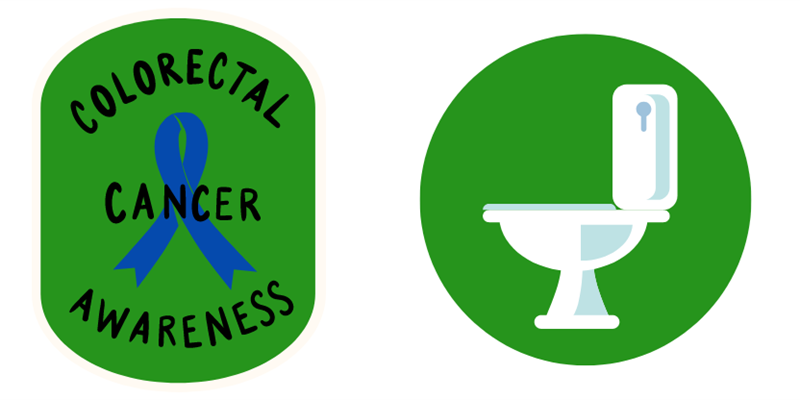
This month is colorectal cancer awareness month. Our Cancer Information Development Nurse, Sue, has written a blog with all you need to know about colorectal cancer.
Colorectal cancer, or bowel cancer - is the 4th most common cancer in the UK[1]. The term bowel cancer is normally used when talking about colon cancer and rectal cancer.
Bowel cancer can be curable if it is found early. So being aware of symptoms and seeing your GP sooner rather than later can make a real difference.
Symptoms of colorectal cancer
No one likes talking about bowels and poo! And it can feel embarrassing to see your GP with bowel problems. But remember they are used to dealing with embarrassing topics. And they are there to help and support you.
So when should you see your GP? The following lists the main symptoms of bowel cancer:
These symptoms can be caused by other conditions, but you should always get them checked by your doctor.
Bowel cancer screening
Some people may be diagnosed through the bowel cancer screening programme. This is offered to people aged between 50 and 60, depending on which part of the UK you live. If you are registered with a GP you will automatically be invited to take part.
Bowel cancer screening involves sending a very small sample of your poo to a laboratory where it is checked for tiny amounts of blood.
Reducing the risk of bowel cancer
There are things you can do that can help reduce your risk of getting bowel cancer. Nothing can completely reduce your risk but doing the following can help.
There are some risk factors for bowel cancer that you can’t do anything about. This includes getting older or having an inflammatory bowel condition. And remember not having any risk factors does not mean you definitely won’t get bowel cancer.
A few people are at a higher risk of developing bowel cancer. This is because they have an inherited gene change that increases their risk. They may be offered screening and other treatments to help reduce or manage their risk.
Treatment for bowel cancer
There are different treatments for bowel cancer. Surgery is the main treatment. For some people it may be the only treatment they need. Other treatments include chemotherapy and radiotherapy. Targeted therapy and immunotherapy may be used if the cancer comes back or has spread to other parts of the body.
For information, support or just someone to talk to, call 0808 808 00 00 or visit macmillan.org.uk. We also have a playlist on our YouTube channel about bowel cancer.
1] https://www.cancerresearchuk.org/health-professional/cancer-statistics/statistics-by-cancer-type/bowel-cancer#heading-Zero
Whatever cancer throws your way, we’re right there with you.
We’re here to provide physical, financial and emotional support.
© Macmillan Cancer Support 2025 © Macmillan Cancer Support, registered charity in England and Wales (261017), Scotland (SC039907) and the Isle of Man (604). Also operating in Northern Ireland. A company limited by guarantee, registered in England and Wales company number 2400969. Isle of Man company number 4694F. Registered office: 3rd Floor, Bronze Building, The Forge, 105 Sumner Street, London, SE1 9HZ. VAT no: 668265007